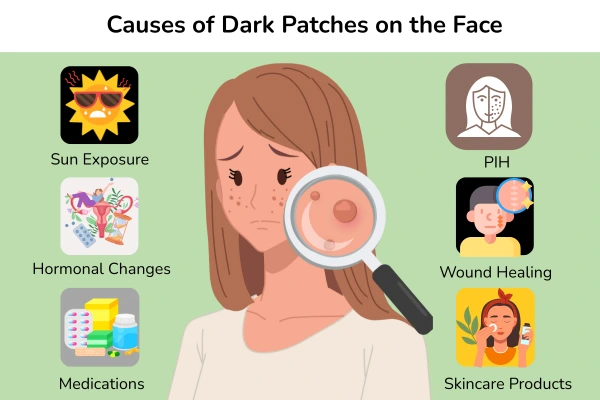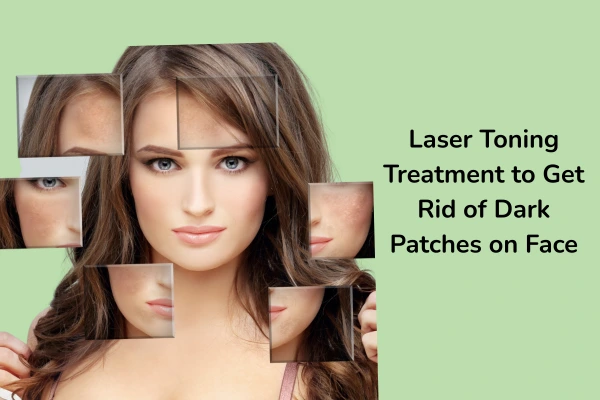Up to 25% OFF on Selected Treatments
-
Treatments
Acne and Scar
Pigmentation
Laser Hair Reduction
Dermato-surgery
Body
Anti Aging
Skin Rejuvenation
Others
- Clinics
- Blogs
Treatments
Your skin is a reflection of your overall health, and any changes in its tone or texture can be concerning. Have you recently noticed dark patches on face? These uneven skin discolorations can be frustrating and may affect your confidence. Dark patches on the face often appear as areas of pigmentation that are visibly darker than the surrounding skin, commonly found on the cheeks, forehead, and around the mouth. Sun exposure is one of the leading causes, but several other factors, including hormonal changes, lifestyle habits, and underlying skin conditions, can contribute to their formation.
If you are struggling with stubborn dark patches on the face, understanding their root causes is the first step to finding the right treatment. The good news is that various dermatological treatments and skincare solutions can help restore your skin’s natural tone and glow. In this blog, we will explore the causes, prevention tips, and the most effective treatments, including advanced dermatological procedures, to help you achieve clear and even-toned skin. Keep reading to discover the best ways to tackle dark patches on the face!
Must Read: What causes Pigmentation on Face: Find out the best treatments & Expert Tips
Dark patches on the face are primarily caused by an overproduction of melanin, the pigment responsible for skin color. This excess melanin can lead to uneven skin tone and visible discoloration. Several factors can trigger this condition, ranging from external influences like sun exposure to internal changes such as hormonal imbalances. Below are some dark patches on face causes :

Now you have a better understanding of the root cause of your dark patches on the face; now let’s move on to the best dark spots treatments available to treat these patches to achieve clear, radiant skin.
Preventing dark patches on your face starts with adopting a good skincare routine and making mindful lifestyle choices. While some causes, like hormonal changes, may be unavoidable, the following dermatologist-recommended tips can help minimize the risk of developing dark spots and prevent existing ones from worsening.
If you notice persistent or worsening pigmentation, consult an experienced dermatologist at Evenly Skin and Hair Clinic. By following these preventive measures, you can significantly reduce the chances of developing dark patches. If you are already dealing with pigmentation, don’t worry! In the next section, we will explore the most effective treatments for fading dark spots and restoring your skin’s natural glow.
Dark spots and patches can be difficult to treat, so consulting a dermatologist is recommended. Dark spots on the face don’t disappear overnight. It takes time for treatments to show visible results, and while they can significantly lighten the spots, complete fading may depend on the depth and severity of the patch.

This is an advanced Q-switch laser treatment that penetrates deep into the skin to break down excess melanin, reducing pigmentation and improving skin tone. It is particularly effective for melasma and sun-induced pigmentation, offering long-lasting results.
To address the dark patches on the face, our dermatologist recommends chemical peel treatment, such as glycolic acid, phenol, TCA, or yellow peels, to exfoliate the skin, removing pigmented cells and revealing fresher, brighter skin.
Must Read: Chemical Peel or Laser Treatment for Pigmentation: Which is Best for You?
Glutathione IV is a powerful antioxidant treatment that lightens pigmentation, evens skin tone, and boosts overall skin radiance by reducing oxidative stress. This is available in oral and injection form.
This is another non-invasive dark spots treatment that uses carbon lotion and laser energy to deeply cleanse pores, remove surface pigmentation, and give the skin a brighter appearance.
A fractional CO2 laser combined with Microneedling Radiofrequency (MNRF) enhances skin rejuvenation by removing damaged skin layers and stimulating collagen production. This treatment significantly reduces deep pigmentation and improves overall skin texture.
Must Read: Laser Resurfacing: A Comprehensive Guide to Skin Care and Treatment
Microneedling stimulates collagen production and improves skin tone. When combined with PRP (also known as the “Vampire Facial”), it accelerates healing, enhances pigmentation reduction, and promotes even skin texture.
At Evenly Skin and Hair Clinic, our specialized Bright ON Medifacial deeply hydrates, exfoliates, and nourishes the skin to reduce pigmentation, while Hydrafacial helps remove surface dullness and detoxifies the skin for a brighter complexion.
As a part of treatment, dermatologists often prescribe topical creams along with advanced dark patches on the face. It contains ingredients like:
Treating dark patches on the face is not just about the external appearance. It’s also about addressing any underlying causes and adopting a healthy lifestyle. This includes eating a balanced diet, managing stress, and getting enough sleep.
Dark spots and pigmentation on the face can be stubborn, but the right treatment can help you achieve a clearer, more even complexion. While a few skincare products may offer temporary relief, professional dermatological treatments provide long-term, effective results.
At Evenly Clinic, our expert dermatologists personalize treatments to target your specific concerns, ensuring safe and lasting improvements.
If you are ready to say goodbye to dark patches on your face and restore your skin’s natural glow, schedule a consultation with our specialists today—because your skin deserves the best care!
Evenly Skin and Hair Clinic – HSR Layout
Third Floor, 815, 27th Main Rd, above Bluestone, 1st Sector, HSR Layout, Bengaluru, Karnataka 560102
Evenly Skin and Hair Clinic – Jayanagar
35, Ground Floor, Vinyas Arcade, 11th Main Rd, Vishya Bank Colony, 5th Block, Jayanagar, Bengaluru, Karnataka 560041
For health-related information, follow us on Instagram!!
Click here for an online consultation!!
What causes dark patches on the face?
Dark patches on the face result from excess melanin production, triggered by sun exposure, hormonal changes, aging, and inflammation.
Can sunscreen help reduce dark patches?
Yes, broad-spectrum sunscreen prevents further pigmentation and protects the skin.
What is melasma?
Melasma is a common hormonal pigmentation disorder, causing dark patches on the face, especially during pregnancy or due to birth control pills.
Can men get melasma?
Yes, although it is more common in women, men can also develop melasma due to hormonal imbalances and sun exposure.
Do acne scars turn into dark patches on the face?
Yes, if not treated properly, acne scars can lead to post-inflammatory hyperpigmentation.
We hope this information is helpful. If you have any skin and hair-related questions or would like to discuss personalized solutions, please reach out to us at 7337899030. Our team of specialists is committed to delivering personalized care tailored to your specific needs. Take the first step towards a healthier, more confident you by scheduling a consultation with us today. Your journey to vibrant skin and stronger hair begins here.
Book an Appointment
Start your journey to healthy skin and hair today.
Leave a Comment
1 comment
Henry
February 6, 2026Hello there! This post couldn't be written much better! Looking through this post reminds me of my previous roommate! He continually kept talking about this. I most certainly will forward this post to him. Pretty sure he will have a great read. Thank you for sharing!